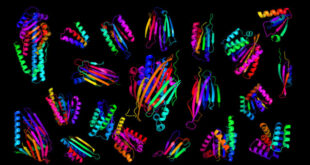Losing just one night of sleep can have a tissue-specific impact on the regulation of gene expression and metabolism, according to new study. The findings, published in the journal Science Advances, may explain how long-term shift work and chronic sleep loss can impair metabolism and adversely affect human body composition.

Sleep loss contributes to adverse weight gain. Image credit: Tookapic.
Previous epidemiological studies have shown that the risk for obesity and type 2 diabetes is elevated in those who suffer from chronic sleep loss or who carry out shift work.
The new study is the first to link how sleep loss, at the cellular level, affects metabolism in two tissues that are key for regulating metabolism.
It found that even one night of sleep loss can alter how genes and proteins are expressed in a tissue-specific manner in fat and skeletal muscle.
“Until now, we’ve never known whether sleep loss can cause molecular changes at the tissue level, but now that we do, it may explain how disrupted or mistimed sleep in the long run can increase the risk of adverse weight gain in humans,” said Dr. Jonathan Cedernaes, a scientist at Northwestern University Feinberg School of Medicine and corresponding author of the study.
“While one night of sleep loss negatively impacted the tissue, the sleep loss would need to become chronic before leading to actual weight gain.”
Dr. Cedernaes and colleagues studied 15 healthy normal-weight individuals who participated in two in-lab sessions in which activity and meal patterns were highly standardized.
In randomized order, the participants slept a normal night of sleep (over eight hours) during one session, and were instead kept awake the entire night during the other session.
The morning after each night-time intervention, small tissue samples (biopsies) were taken from the participants’ subcutaneous fat and skeletal muscle. These two tissues often exhibit disrupted metabolism in conditions such as obesity and diabetes.
At the same time in the morning, blood samples were also taken to enable a comparison across tissue compartments of a number of metabolites. These metabolites comprise sugar molecules, as well as different fatty and amino acids.
The tissue samples were used for multiple molecular analyses, which first of all revealed that the sleep loss condition resulted in a tissue-specific change in DNA methylation, one form of mechanism that regulates gene expression.
“We were the first to demonstrate that acute sleep loss in and of itself results in epigenetic changes in the so-called clock genes that within each tissue regulate its circadian rhythm,” Dr. Cedernaes said.
“Our findings indicate that sleep loss causes tissue-specific changes to the degree of DNA methylation in genes spread throughout the human genome.”
“The parallel analysis of both muscle and adipose tissue further enabled us to reveal that DNA methylation is not regulated similarly in these tissues in response to acute sleep loss.”
“Further analyses of gene and protein expression demonstrated that the response as a result of wakefulness differed between skeletal muscle and adipose tissue.”
“The period of wakefulness simulates the overnight wakefulness period of many shift workers assigned to night work,” the study authors said.
“A possible explanation for why the two tissues respond in the observed manner could be that overnight wakefulness periods exert a tissue-specific effect on tissues’ circadian rhythm, resulting in misalignment between these rhythms.”
The team only studied the impact of one night of sleep loss and therefore do not know how other forms of sleep disruption or circadian misalignment would have affected the participants’ metabolism across the investigated tissues.
“It will be interesting to investigate to what extent one or more nights of recovery sleep can normalize the metabolic changes that we observed at the tissue level as a result of sleep loss,” Dr. Cedernaes said.
_____
Jonathan Cedernaes et al. 2018. Acute sleep loss results in tissue-specific alterations in genome-wide DNA methylation state and metabolic fuel utilization in humans. Science Advances 4 (8): eaar8590; doi: 10.1126/sciadv.aar8590
 #Bizwhiznetwork.com Innovation ΛI |Technology News
#Bizwhiznetwork.com Innovation ΛI |Technology News



